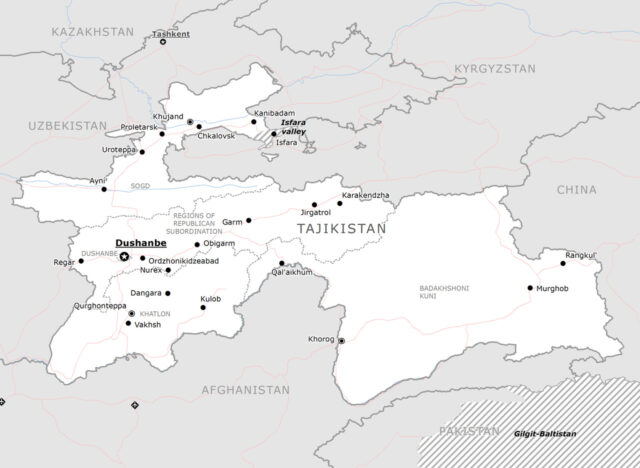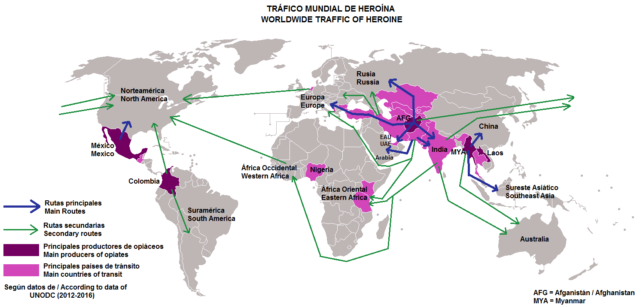
Geopolitical Report ISSN 2785-2598 Volume 36 Issue 1
Author: Giuliano Bifolchi
The Russian ambassador in Dushanbe recently underscored a notable upswing in collaborative efforts between Russia and Tajikistan, specifically in the realms of security and countering drug trafficking, confirming Moscow’s strategy to strengthen its influence in the Central Asian republic.
This strategic partnership aims to fortify Tajikistan against potential threats emanating from its tumultuous neighbour, Afghanistan. The withdrawal of U.S. troops and the subsequent ascension of the Taliban to power in Afghanistan have heightened apprehensions regarding Tajikistan’s internal security and overall stability.
The intensified cooperation between Russia and Tajikistan signifies a proactive response to the evolving geopolitical landscape, demonstrating a shared commitment to addressing the complex challenges that have emerged in the wake of recent regional developments.
This collaboration not only reflects the immediate concerns surrounding Afghanistan, but also underscores a broader commitment to bolstering regional stability and security in Central Asia.
Russia-Tajikistan Cooperation Against Drug Trafficking:
Background Information
On November 12th, 2023, Russian Ambassador to Tajikistan, Semyon Grigoriev, attended the round table “The Role of Emomali Rahmon in the formation and the development of the Shanghai Cooperation Organisation” and emphasised the Tajik work in countering drug trafficking from neighbouring Afghanistan and monitoring the situation in this country.
Grigoriev also stated that Moscow is ready to seek new methods of countering threats like drug trafficking and terrorism with Dushanbe within the framework of the Shanghai Cooperation Organization (SCO).
The Russian ambassador also noted that Moscow supports Rahmon’s other initiatives in the SCO since the Russian Federation sees Central Asia the core of this organisation.
Grigoriev added that the SCO economic development strategy until 2030, which was developed on the initiative of the President of Tajikistan, is becoming relevant.
Previously, on October 13th, 2023, Russian President Vladimir Putin met with Tajik President Emomali Rahmon in Bishkek, during the summit of the Commonwealth of Independent States (CSI), and accentuated the bilateral cooperation in the security field.

Geopolitical Scenario
- Russia’s influence and relation with Tajikistan: Tajikistan’s symbiotic relationship with Russia has propelled its economic ascent, evidenced by a notable increase of 51.8% in Tajik labourers in Russia within a year. This surge, driven by heightened Russian defence orders and domestic labour mobilisation, has resulted in an upswing in remittances, significantly affecting household consumption.
In addition, Russia’s intentional focus on Tajikistan’s security role is clear in robust bilateral and multilateral engagements within organisations like the Collective Security Treaty Organisation (CSTO), the Commonwealth of Independent States (CIS), and the Shanghai Cooperation Organisation (SCO). - Moscow-Dushanbe’s cooperation in defence and security. Tajikistan holds a crucial role in Russian foreign policy because of historical, national security, and territorial integrity concerns. Proximity to Afghanistan positions Tajikistan as a key player in the security framework of Eurasia, with threats from Afghanistan having repercussions for both Russia and broader Central Asia. Therefore, after the U.S. troops’ withdrawal from Afghanistan and the Taliban’s rise to power in Kabul, Moscow and Dushanbe have increased their efforts and cooperation to counter any threats coming from the Afghan territory, which has experienced a surge of jihadist propaganda, violent attacks, and illicit trafficking.
- Tajikistan’s measures to counter terrorism and security threats. Since August 2021, Tajikistan has increased its measures and operations to stabilise and secure its borders with Afghanistan, prevent the spread of jihadist groups, and avoid internal destabilisation. Dushanbe’s paid special attention to the border area, especially after the establishment of Tehrik-e Taliban Tajikistan (TTT).
Conclusion
Russia’s commitment to security cooperation with Tajikistan reflects the Kremlin’s overarching strategy of maintaining a dominant role in the post-Soviet sphere, focusing particularly on Central Asia.
Tajikistan’s strategic position in the region, coupled with its membership in the Collective Security Treaty Organization (CSTO) and the Shanghai Cooperation Organization (SCO), provides Moscow with avenues to strengthen its influence within the country. These organisations, by exploiting the necessity to counter terrorism and drug trafficking, serve as platforms through which Russia can bolster its presence in Tajikistan and extend support to President Rahmon’s leadership.
Despite geopolitical tensions arising from the Ukraine conflict and imposing Western economic sanctions against Russia, Dushanbe has maintained a positive stance towards Moscow. This enduring cooperation underscores the effectiveness of Russia’s multifaceted approach, leveraging both regional alliances and diplomatic relations to merge its position in Tajikistan.
Do you like SpecialEurasia reports and analyses? Has our groundbreaking research empowered you or your team? Now is your chance to be a part of our mission! Join us in advancing independent reporting and unlocking the secrets of Eurasia’s complex geopolitical landscape. Whether through a one-time contribution or a monthly/yearly donation, your support will fuel our relentless pursuit of knowledge and understanding. Together, let’s pave the way for a brighter future. DONATE NOW and secure your place in shaping the geopolitical narrative.
